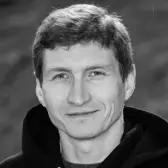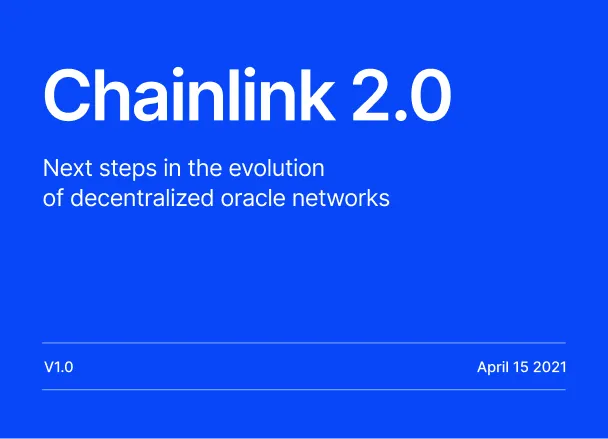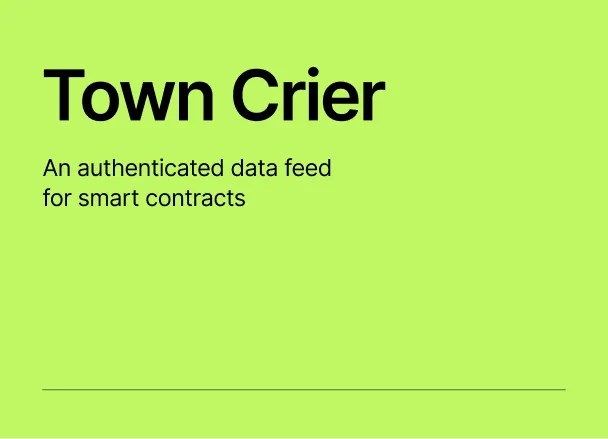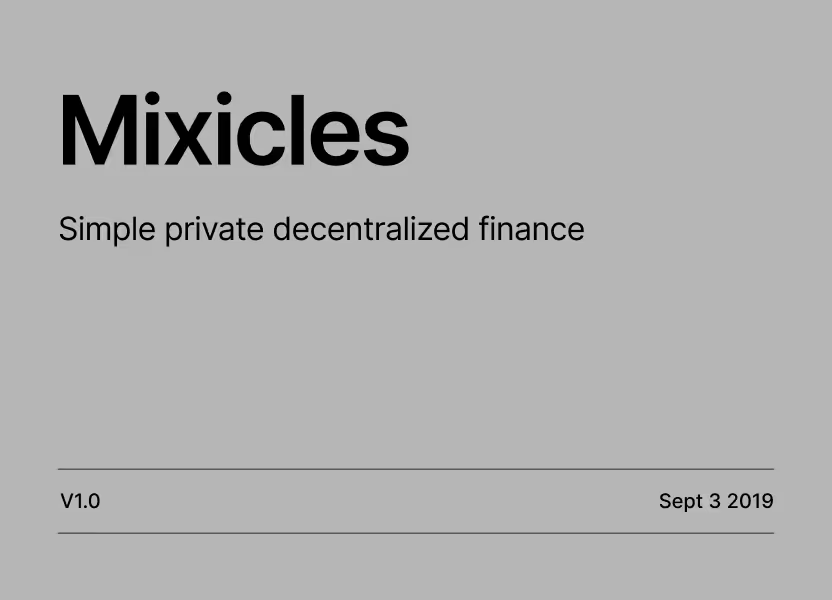
Inventing the onchain future
Chainlink Labs has pioneered numerous key technologies for the blockchain industry. By blending academic research with real-world needs, we accelerate innovation to help developers build the next generation of dApps and institutions connect their existing systems to any blockchain.

Research team

Lorenz Breidenbach
Lorenz Breidenbach is the head of R&D at Chainlink Labs. He is a security researcher and former BRIDGE fellow from ETH Zürich and IC3. He previously conducted research at Cornell Tech and spent time in industry at Google and Open Systems.

Ari Juels
Ari Juels is currently Chief Scientist at Chainlink Labs. He is also the Weill Family Foundation and Joan and Sanford I. Weill Professor in the Jacobs Technion-Cornell Institute at Cornell Tech and a Computer Science faculty member at Cornell University. He is a Co-Director of the Initiative for CryptoCurrencies and Contracts (IC3). He was previously Chief Scientist of RSA.

Siam Hussain
Siam Hussain is a researcher in the field of privacy. He has a PhD in Computer Engineering from UCSD. His primary research focus is enabling data-intensive systems with provable privacy guarantees in practical settings. He has developed several open-source frameworks for secure Multi-Party Computation (MPC) as well as a number of MPC-based applications.

Yan Ji
Yan Ji is a research engineer at Chainlink Labs. Her research focuses on quasi-decentralized system design, aiming to bridge the gap between cutting-edge blockchain technology and legacy systems. She is passionate about developing transparent, privacy-preserving, and scalable applications that benefit a broad user base. Yan holds a PhD in Computer Science from Cornell University.

Kostis Karantias
Kostis Karantias is a research engineer at Chainlink Labs. His research interests include cross-chain interoperability, light clients, and state synchronization. Prior to joining Chainlink Labs, he worked at IOHK and Bloomberg. He holds an MEng from the University of Ioannina.

Roman Kashitsyn
Roman is a research engineer fascinated by algorithm design, distributed systems, and applied mathematics. Prior to joining Chainlink, he worked at DFINITY, Google, and Yandex. He holds a Specialist degree from Lobachevsky University, where he discovered his enduring, if hopeless, love for pure math.

Christian Müller
Christian Müller is an engineer and researcher interested in BFT protocols, cryptography and distributed systems. Prior to joining Chainlink Labs, he gathered broad software engineering experience, most notably at DFINITY building the IC protocol and at other projects, solving Ethereum fragmentation challenges. He holds a PhD in Formal Methods from Saarland University.

Gregory Neven
Gregory Neven is a principal research engineer at Chainlink Labs. He is a researcher in cryptography and information security, with a focus on provably secure cryptographic protocols. He has published over 60 research papers and patents in the field. He has a PhD from K.U.Leuven, Belgium, and previously worked as a research scientist at DFINITY and IBM Research.

Philipp Schindler
Philipp Schindler is a research engineer at Chainlink Labs. He is highly enthusiastic about constructing secure and scalable distributed systems and connecting advanced research with practical applications. Before joining Chainlink Labs, Philipp worked as a researcher and IT security specialist at SBA Research and the University of Vienna. He holds a PhD in computer science from TU Wien, awarded with the highest distinction for his contributions to distributed protocols.

Chrysa Stathakopoulou
Chrysa Stathakopoulou is a distributed systems researcher, passionate about decentralizing computation and trust with highly performant systems. Prior to joining Chainlink Labs, she worked at the blockchain group in IBM research focusing on consensus protocols. She holds a PhD from ETH Zurich.

Paweł Szałachowski
Paweł Szałachowski is an engineer and researcher interested in blockchains, network security, and applied cryptography. Prior to joining Chainlink Labs he worked at Google and in academia. He holds a PhD from Warsaw University of Technology.

Manuel Vidigueira
Manuel Vidigueira is a research engineer at Chainlink Labs. He is passionate about developing secure and fault-tolerant distributed systems, with an emphasis on performance and practicality. Manuel holds a PhD in Computer Science from EPFL.
If you are a researcher and you want to collaborate with us, contact us here.
Advisors

Dan Boneh
Dr. Boneh is a professor of Computer Science at Stanford University where he heads the applied cryptography group and co-directs the Center for Blockchain Research. Dr. Boneh's research focuses on applications of cryptography to blockchains and to computer security. He is the author of over 200 publications in the field, and is a recipient of the 2014 ACM prize and the 2013 Godel prize. In 2016 he was elected to the National Academy of Engineering.

Christian Cachin
Christian Cachin is a professor of computer science at the University of Bern, where he has led the Cryptology and Data Security Research Group since 2019. He worked for IBM Research for more than 20 years. He is an ACM Fellow, IEEE Fellow, recipient of multiple IBM Outstanding Technical Achievement Awards, and has also served as the president of the International Association for Cryptologic Research (IACR) from 2014-2019.

Farinaz Koushanfar
Farinaz Koushanfar is the Henry Booker scholar professor of Electrical and Computer Engineering at the University of California San Diego, where she is the founding co-director of UCSD MICS (Center for Machine Intelligence, Computing, and Security). Her research is focused on automated holistic cross-layer co-design and optimization of Learning Algorithms, Security, and Privacy-Preserving Computing / Secure Multi-Party Computation.

Dahlia Malkhi
Dahlia Malkhi is a distinguished scientist at Chainlink Labs. She has been the CTO at the Diem Association, lead researcher at Novi, co-founder of VMware Research, principal partner researcher at Microsoft Research, and a tenured professor at the Hebrew University of Jerusalem. She has co-invented numerous innovations, including HotStuff, CorfuDB, Flexible Paxos, and Vertical Paxos, and has more than two decades of research experience in industry and academia, having led applied and foundational research focused on the reliability and security of distributed systems.

Mike Reiter
Michael Reiter is a James B. Duke distinguished professor in the departments of Computer Science and Electrical & Computer Engineering at Duke University. He has been recognized as a Fellow of the ACM and IEEE and received the ACM SIGSAC Outstanding Contributions Award for his research contributions in computer security and fault-tolerant distributed computing.

Fan Zhang
Fan Zhang is an Assistant Professor in the Department of Computer Science at Yale University. His research aims to solve real-world security problems leveraging decentralized consensus (aka blockchains), cryptography, game theory, and even trusted execution environments (TEEs). He is the recipient of an NSF SaTC Frontier grant (co-PI), multiple Ethereum Academic Grant awards, a Flashbots Research Grant, a Sui Academic Research Award, a Yale Roberts Innovation Award, and an IBM Ph.D. Fellowship. He created Town Crier and DECO as part of his PhD at Cornell.
Academic partners

Giulia Fanti
Giulia Fanti is an assistant professor of Electrical and Computer Engineering at Carnegie Mellon University. Her research interests span the algorithmic foundations of blockchains, distributed systems, privacy-preserving technologies, and machine learning. She obtained her PhD in EECS from U.C. Berkeley and her B.S. in ECE from Olin College of Engineering.








